The Adventure
"Jesse James said before he died
There's five things I'd like to ride.
A bicycle, tricycle, automobile,
An M1 tank and a ferris wheel"
Basic Training
Having just turned 18 and only three months out of high school, it was the first time that I had been away from home. Standing in front of me was someone I didn't know and he seemed to be pretty upset with me. The shouting was non-stop. It didn't matter what you did, it was wrong. I doubt I was the only person there wondering what I had got myself into. It was around midnight after a long day of traveling. I hadn't slept the night before. We had a going away party for me with friends and relatives visiting. My recruiter picked me up at 3 AM to drive me down to the Military Entrance Processing Station in Detroit. It was about a three hour drive from Auburn to Detroit by the time we made multiple stops on the way to pick up others who were about to share the same experience.
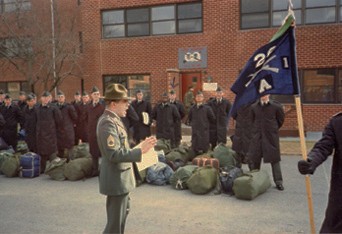
Graduation day
The morning and early afternoon at MEPS was spent wrapping up some final paperwork before flying to Newark, New Jersey. The rest of the day was spent flying, sitting in the airport during layovers, and waiting for the bus to finally make the one hour trip from the airport to Ft. Dix. A combination of nervousness and excitement made sleeping during these waits impossible.
When we finally arrived at Ft. Dix, a Drill Sergeant boarded the bus and pleasantly greeted us. "Ladies and gentlemen, welcome to Ft. Dix. Please gather all of your belongings and GET THE BLEEP OFF OF MY BUS! HURRY UP! WE DON'T HAVE ALL BLEEPING NIGHT!" We quickly piled off the bus, not sure what to do next. We stood around outside the bus in a disorganized group as multiple Drill Sergeants took their turn with each one of us, welcoming us to the Army. "YOU'RE IN MY ARMY NOW AND YOU BETTER DO WHAT THE BLEEP YOU'RE TOLD. YOU'LL DO EXACTLY AS I TELL YOU AND NOTHING MORE. YOU DON'T GET PAID TO THINK. YOU GET PAID TO FOLLOW ORDERS. DO YOU UNDERSTAND ME LOW LIFE?"
We were always hollered at, even when the instructions could have been given in a normal tone of voice. This was just one way to create stress. Another way to create stress was to give you impossible times to complete tasks. Each platoon had designated road guards. They were the guys who had a few extra pounds to lose and were jokingly referred to by the Drill Sergeants as overweight lovers.
Whenever we would march somewhere (we marched everywhere), the road guards would run up to an intersection ahead of the formation and stop traffic. The overweight lovers got the road guard assignment because "they need the exercise." After the formation would pass the road, the road guards had to run to catch back up and get back into formation to continue marching. As a former road guard, I can confirm that you get a lot of extra exercise doing this.
Road guards had to wear reflective vests. When we would reach our destination, before we would do anything, the road guards had to take off their vests and put them in their pants cargo pocket. "ROAD GUARDS, YOU'VE GOT 10 SECONDS TO PUT AWAY YOUR ROAD GUARD VESTS AND 3 OF 'EM ARE GONE!" Then they would count down from 7 to 0 while you attempted to complete a 15 second task in 7 seconds. "TOO BLEEPING SLOW! GET DOWN AND BEAT YOUR FACE!" "Beat your face" meant to do push-ups. After about 20 push-ups the soldier would ask, "Drill Sergeant, request permission to recover?" "BLEEP NO, I'M NOT TIRED YET! KEEP PUSHING!" the Drill Sergeant would reply.
Wake up was 0400 and first formation was 0415. In 15 minutes, you were expected to wake up, make your bunk (nice tight sheets and blankets), get dressed, brush your teeth, shave, clean the latrine, and be outside standing in formation. You can't possibly do all of that in 15 minutes and you can't turn the lights on before 0400. The way we ended up doing it was we got up at 0330 and did it by flashlight until 0400. Have you ever tried making the bed or lacing up your boots with a flashlight tucked under your chin?
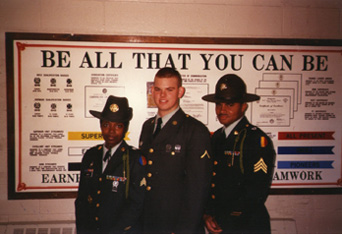
Drill Sergeant White and Drill Sergeant Brown
As I mentioned earlier, part of the training was to put you in situations that stress you. A mild example was at the mess hall one day. A soldier had just got his tray of food and he was walking to the table to sit down and eat. One of the Drill Sergeants called him over to the table where only the Drill Sergeants eat. There was an open seat between the two Drill Sergeants at the table. The conversation went like this.
- Drill Sergeant 1: "Hey Private, come sit down next to me and eat lunch."
- Drill Sergeant 2: "Private, don't you dare sit down next to me. Get over there where you belong."
- Drill Sergeant 1: "Private, I said SIT DOWN AND EAT WITH ME!"
- Drill Sergeant 2: "Private, if you sit down next to me I will take you outside and smoke you."
- The soldier stood there, not knowing what to do. After a brief pause, the Drill Sergeants started laughing.
- Drill Sergeant 1: "Private, get outta of my face!"
Scheduled training started at 0415 and went until about 1700, right before dinner. PT was done 6 days a week first thing in the morning. We started off doing stretching exercises, then got into more physical stuff like push-ups, leg lifts, crunches and sit-ups. We then finished it off with a run. The run was anywhere from 3 to 5 miles. I went through basic training in mid November and finished at the end of January. It was quite cold at times. Weather didn't matter. If the ground was cold and soaking wet, we still laid on our backs to do sit ups.
Even in the cold weather without much warm clothing, you could work up quite a sweat. After PT, we stood outside in our wet, sweaty clothes for about 25 minutes while the Drill Sergeants went inside to shower and change. "IT'S NOT COLD OUT! IT'S YOUR WEAK PRIVATE MIND!" Maybe that's why most of us got sick during basic. When the Drill Sergeants came back out, we went to breakfast.
Breakfast was the best! Eggs, bacon, sausage, ham, grits, potatoes, biscuits and gravy, toast, cereal, white and chocolate milk, orange and grape juice, and coffee. The soldiers toward the end of the line were sometimes rushed, but for the most part, there was plenty of time to eat. Quiet chit chat was permissible as long as you didn't stop eating to sit there and talk. If you got caught talking and not eating, you were made to leave without finishing. I never let that happen.
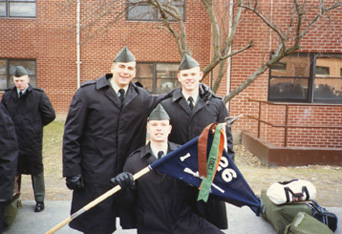
Speak, Munn, and I
After breakfast, we would march to our training site. Sometimes it was a classroom, sometimes it was outside, depending on the type of training. Other times we started off in the classroom for lectures, and then went outside for practical hands-on training. It was nice to be able to sit down in a classroom and relax a little. We were quite active most of the time. The break was always appreciated.
The bad part about classroom lecture is that it was always toasty warm in there and with the little bit of sleep that we got, it was difficult to stay awake. Especially after the breakfast that I described above! If you get caught sleeping in class, they call you to the back of the room and they smoke you. That wasn't much fun.
Getting smoked is when you have to do any number of exercises, frequently one after the other, until the Drill Sergeant gets tired of watching you, or until you reach muscle failure. About 20 minutes is typical. Just because your arms have reached muscle failure doesn't mean that you can't do leg exercises. They made you do any number of exercises, though the most common ones were push-ups, leg lifts, stair climbers, the chair, and one of two thinking positions.
The chair is where you put your back up against the wall and slide down the wall a ways until your legs are bent at 90 degrees. You kind of look like a chair with your lower legs being the chair legs, your thighs being the seat, and your upper body being the back rest. Then you stick both arms straight out to the front like the arms of the chair. Now hold that position until they tell you to stop. Your legs will burn!
One variation of the thinking position is similar to the chair except you don't lean against a wall. You just bend your legs about 45 degrees and stick your arms straight out in front of you. The second variation of the thinking position goes like this. Lie on the ground on your stomach with your legs together, your elbows on the ground, and your chin in your hands. It's kind of like you might lie on the floor and watch television. Now raise your body up off of the ground so that your back is straight and only your toes and elbows are touching the ground. You're kind of in an up push-up position except you're on your elbows instead of your hands. Now hold that position. While you're holding that position, you can think about what you did wrong. That's why it's called the thinking position.
If you're lucky, you'll only have to do push-ups until you reach muscle failure. Believe me, getting smoked will wake you up. Unfortunately, after being physically active almost all day and getting about four hours of sleep per night, your alertness is short lived. In only a matter of minutes, sometimes even before you've caught your breath from being smoked, your eyelids become heavy again. To top it all off, when someone gets caught sleeping in class, not only the sleeper, but the soldiers sitting on both sides of him get smoked too because they let you fall asleep!
We would march from our training area to the mess hall around noon for lunch. If we happened to be in one of the farther out training areas, say the bayonet or rifle range, we would have the food delivered to us from the mess hall. The meal was a little more casual when eating outside. Sometimes eating areas were available, which consisted of a series of long wood planks about chest high that you could stand by and use as a table. Other times, sitting on the ground or leaning up against a tree sufficed. I always enjoyed eating outside.
Training would continue after lunch until dinner time. All aspects of being a soldier were covered.
| Primary Areas of Study Covered in Basic Training | |
|---|---|
| First Aid | Communications |
| Basic Rifle Marksmanship | Drill & Ceremonies |
| Obstacle Course | Enemy Vehicle Identification |
| Firing Range | Map Reading & Compass Course |
| Bivouac Field Exercise | Nuclear, Chemical, & Biological |
| Confidence Course | Hand Grenade Assault Course |
| Fire & Maneuver | Individual Tactical Training |
| U.S. Weapons | Bayonet Training |
| Hand to Hand Combat | Night Fire |
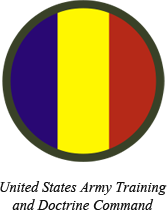
When basic training started, whoever was assigned as your bunkmate was your ranger buddy. My ranger buddy was Cliff McDonald from Charleston, South Carolina. You always had to look out for your ranger buddy. You helped him with his gear, you studied your Smart Book together, and usually when one of you got in trouble, you both paid for it. Your Smart Book is your soldier's guide. It's like a basic training textbook. Any time we had to wait for something (which was quite often) we had to study our Smart Books. It didn't matter if you were sitting or standing up in the hallway.
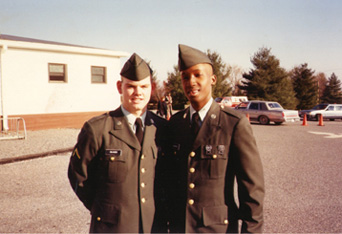
My ranger buddy, Cliff McDonald, and I
After dinner, by about 1800, we were usually confined to the barracks. Cleaning, polishing, and buffing everything in the barracks was top priority at this time. We also had to find time to study the training topics covered in the previous days. Before graduation, we would have to pass skills tests, called Soldier Stakes, on what we learned, so knowing the material was a must.
Writing letters home always seemed to find its way toward the top of the priority list. Mail call was one of the best times of the day. When you write letters, you receive letters. Getting a letter in the mail was usually enough to fix any bad day that you might have been having. Showers had to be done by 2000 so we had time to clean the latrine before lights out. There was certainly no time to do it when we got up in the morning.
Lights out was at 2100, and you were ready for it! Unfortunately, not everyone got to go to sleep at that time. There were two people assigned to fire guard duty for a one-hour shift. With a new shift starting every hour, you hoped to get assigned to the early shift or the late shift. If you didn't have fire guard one night, you could count on having it the next night.
We typically only got six hours to sleep anyway. If you get assigned to one of the middle shifts, you get about two hours of sleep, then wake up and pull your one hour shift, then back to sleep for another two hours and it's time to get up! With the early or late shift, you still only got four hours of sleep, but at least it was four straight hours. Your fire guard shift consisted of writing letters and an occasional walk up and down the barracks halls to check on things.
Permanent Party
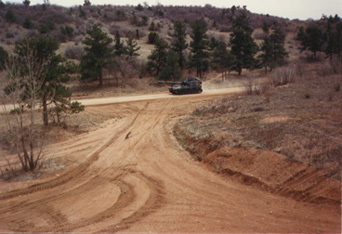
Waiting to ambush the convoy
Permanent party was one of your permanent duty assignments. It was about as close to a nine to five job as you're going to get in the Army. Actually, it was 6 to 5:30, but it was a fairly regular work schedule. Unless you were scheduled for special duty, you had the weekends off. Not counting Desert Storm, I worked less than 10 weekends in the five years that I was in the Army. Where I work now, as a civilian, I'm lucky if I get five Saturdays off a year.
Monday, Wednesday, and Friday were PT days. We had 0600 formation for PT. PT usually ran until about 0730. At that time, we were released to go to breakfast and get ready for work which started at 0900. Mmm, Army breakfast! The married soldiers who lived off post had plenty of time to get home, shower and change, and get ready for work by 0900.
PT at permanent party was different in that you had male and female soldiers together. You also had all age groups. In basic training, 90 percent of the soldiers were 18 to 20 years old. The other 10 percent were people with prior military service who decided to get back in, previous Reserve or National Guard soldiers who wanted to be full time soldiers, or the uncommon 30 year old who just wanted to join the Army. At permanent party, you had 18 to 50 year olds. At this point in a soldier's career, as long as you passed the PT test, which had different requirements based on your age and sex, they left you alone. Also, the older soldiers were the higher-ranking soldiers. Not many people can get away with telling an E-6 that he's a piece of crap and he needs to pick up the pace. It's a different atmosphere and different mind set altogether.
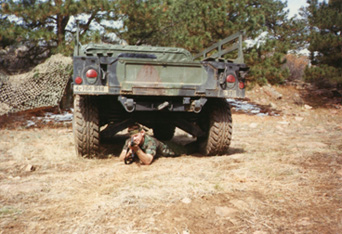
Just messing around
The actual PT workout was similar than that of basic training. We did the same exercises but it just wasn't as intense. There was more personal responsibility involved. In basic training, you got yelled at the entire time about how you weren't trying hard enough, whether you were or not. At permanent party, it was your personal responsibility to pass the PT test or you had to deal with the consequences. You knew how hard you had to work to get in shape and if you didn't, then you paid the price.
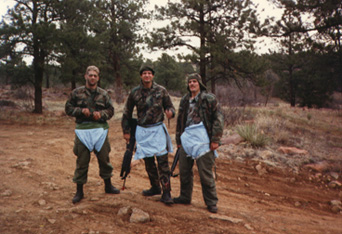
Our POWs
For the run, sometimes we got the opportunity to select which speed group to run with. When you have males and females, age 18 to 50, not everyone has the same requirements or capacity for PT. You got to choose if you wanted to run with the slow, medium, or fast group. I ran with the fast group once. Once! There were only eight of us in a 130 person company that chose to go in the fast group. Peer pressure was the only thing that kept me from falling out of that run. I thought I was in good shape, too. Those guys could run!
One of my favorite things about PT was that I used to call cadence. Whoever was in charge of the formation got to call cadence while running. After a while, they would get tired so others would relieve them of their duties. It's not uncommon for four different people to call cadence during a single run. When you can tell that the caller is getting tired, someone would jump out of formation and take their place. That was fun. It got me motivated, even though in itself, it was tiring. Running and hollering at the same time wears you out.
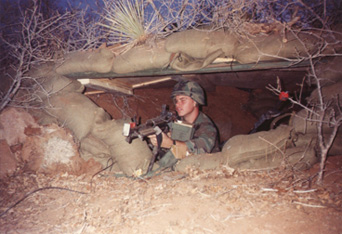
Our M60 point
At 0900, you were expected to be at the shop for work. We usually didn't have formation there and it was a pretty big shop, so no one really knew if you were there on time or not. Each department had a stack of work orders that needed to be completed. Rarely, there were due dates. You just did the job and when it was done, you called the customer to tell them it was ready.
In our shop, we had mechanics (both tracked and wheeled vehicle), welders, machinists, small arms repair and recovery personnel. Recovery was responsible for driving the big trucks with winches that were used to recover stuck vehicles. Vehicles would get stuck in the mud, in the ditch, or just break down and need a tow. That's what Recovery did. They were like the Army tow truck service. The other occupations listed above are pretty much self-explanatory. We did the same things that our civilian counterparts would do, except we only worked on our military equipment.
While not on a training exercise, we simply went to the shop everyday and did the jobs we were assigned to do. The mechanics fixed vehicles, the welders welded things that were broken, and the small arms guys fixed malfunctioning weapons. This is what we did in wartime, and that's what we were always training for. We needed to be able to do our job whether we were in the comfy confines of the shop or in the desert in the Middle East in the middle of a war. Things break down in a war zone and they still need to be fixed. We need to be able to do it anywhere and under any conditions.
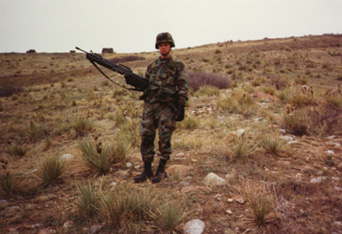
Me with the M203 Grenade Launcher
On Tuesdays, since we didn't have PT, we reported directly to the shop at 0700. We worked until 1730 with an hour and a half lunch. The long lunch was nice. You could actually go to a sit-down restaurant off post, eat, and still have time for a nap if you wanted.
Mondays, Wednesdays, and Fridays had the same schedule, PT in the morning and then work until 1730. Thursday was our training day. Every duty station, on all continents, trained on Thursdays. There was 0600 formation at the company barracks, and then we headed out for training. We practiced our soldier skills. The classes were instructed by a sergeant in the platoon and there was usually a test of some sort at the end.
Even though a guy might have been a mechanic or a cook, they all had soldier skills. Everyone knew how to shoot an M-16, how to read a map, set up a fighting position, and drive all types of military vehicles. You had to keep your skills up on those things because you never knew when you'd have to use them. If you recall the Jessica Lynch story from Iraq, she was in a maintenance unit very similar to the units I was in. You need to be prepared at all times.
Even as a machinist, I went to many different ranges.
- M16
- Grenade
- M60 machine gun
- M2 .50 caliber machine gun
- M203 grenade launcher
- Light anti-tank weapon (LAW)
- Soviet weapons
Training went until lunch. After that, it was business as usual back at the shop until 1730. It made it seem like a short day.
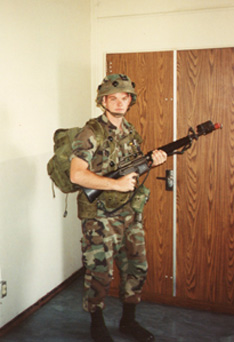
Ready to go on a training mission
As I mentioned earlier, permanent party was pretty much a Monday thru Friday job unless you had special duty. There were two different types of special duty that you might have while in garrison. There was guard duty and CQ.
Guard duty for us took place at the shop. There were guard shacks at each entrance ensuring that only authorized vehicles and personnel entered the facility. Those guard shacks were manned 24 hours a day, 7 days a week. You usually got picked for guard duty about every three months or so. It was a 24-hour shift. Your uniform had to be in top shape; highly shined boots and pressed uniform.
Your actual work hours were usually four hours on and eight hours off. During your eight hours off, you had to stay on the premises and couldn't have visitors, but you could sleep if you wanted. During your four hours on, you stayed in the guard shack and kept a log of all vehicles coming in or out. It was nothing strenuous, just boring.
After pulling any 24-hour duty, you got the next day off. That worked out nice with guard duty since you could sleep in your off time. It wasn't like you were so tired that you had to go home and go right to sleep. CQ, on the other hand, was a different story.
CQ was a 24-hour duty where you had to stay awake all night. It was nothing more than answering the phones after hours and buffing the hallway in the common area of the barracks. It was kind of boring too, although you always got to know someone a little better. Sometimes it was laid back and sometimes it wasn't. It depended who the sergeant was.
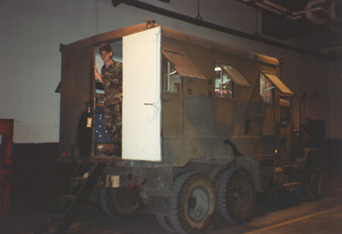
M109 Van - our machine shop
There were always two people on CQ. One was a sergeant and the other was an E-4 or below. Of course it was the E-4 or below that buffed the hallway. When you got off of this duty, you were definitely ready to go to bed. That made your day off not so enjoyable. But, a day off is a day off.
The last situation where you worked the weekends and other 24-hour shifts was when you went out on a field exercise. Field exercises lasted anywhere from a week to 45 days. You would set up tents out in the woods and sleep on cots. A perimeter was set up with fighting positions. During the day, you would perform your normal mission, but in a field environment. It was training for war.
You might not always have a shop to fix vehicles in. Sometimes you have to fix them outside in the winter. Sometimes it's in a mountainous area on a trail. You need to have a mobile workforce that can do their job anywhere. Our machine shop was the M109 van. It had a lathe, a drill press and all the hand tools we needed to get our job done anywhere that we could drive it.
Every year, each unit had to spend at least one week in the field training for combat. They set up a perimeter, dug foxholes, and treated the whole thing like it was a war situation. We even had enemy forces that would attack. I was one of them during one exercise. We ambushed the convoy as they were arriving the site. We captured a few soldiers during a raid a few days later. Since we couldn't interrogate them, we put diapers on them and sent them back to their company.
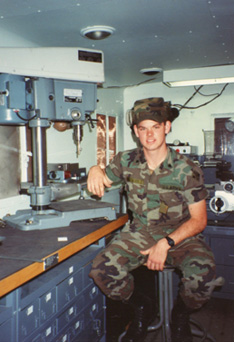
Inside the M109 Van
We used MILES (Multiple Integrated Laser Engagement System) when we went out on these exercises. There was a head harness and a couple strips that went down the front and back of our uniform that detected the laser beam. Our M16s had a laser attached to them. We shot blank rounds. If you were hit, a high-pitched tone would go off telling you that you were dead. It took a special key to turn it off. That's how we would play war games. It was pretty realistic.
For three months at Fort Carson, I was on funeral detail. Anyone who ever served in the military is entitled to a military funeral. I was one of the pallbearers and we had a rifle party who did the gun salute. We had a five state territory, though we never traveled outside Colorado. We did five funerals during my time in the group.
All duty stations have movie theaters, bowling alleys, bars, and parks. They have Burger King, shoppettes, banks, post offices, churches, gymnasiums, and hospitals. When you're not on duty, you can come and go as you please. There is no curfew, but you better be to formation on time in the morning.
You're allowed to have stereos and televisions in your room. You can even have a small amount of furniture, such as a couch or chair. The only restriction is there are no females allowed up in the rooms. The units that I have been in always have all females on the first floor.
There are latrines equipped with showers and washers & dryers on each floor. Each platoon is assigned an area to maintain. Some had the hallways, some had the common areas, and some had the latrines. Purely coincidence, I guess, but every unit I was ever in, I was assigned to the platoon that was responsible for cleaning the latrine. There are multiple mess halls within walking distance.
The post is like a small community with virtually everything that you need within walking distance. Like I said earlier, this is as close as you're going to get in the Army of having an everyday job.
Desert Storm
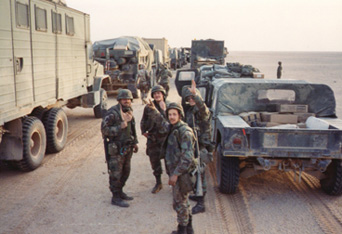
Getting ready to move out
Within hours of arriving in Germany in December of 1990, we were told that all units were being deployed in support of Operation Desert Shield. What timing! After calling home for the first time since arriving in Germany to tell my family everything was fine, I had to call them back and tell them the news.
I just got married in October so my plan was to get settled in at my new duty station and get housing as quickly as possible so I could bring my wife over. As it was, there was about a 6 month wait for government quarters. Now, that wait had been extended even further. Just how long, I had no idea.
It was the evening of the second day that I was in Germany before I finally arrived at my unit. There was always paperwork, processing, and orientation that needed to be done with each change of duty assignment. The amount of paperwork is staggering.
It was around 7:30 when I was dropped off at the barracks. The last few days had been tiring, not to mention the time change from home to Germany. Just prior to flying to Germany, I was on a 30-day leave in between assignments. We stayed at my parents. My wife continued to stay there after I flew to Germany. Having just met for the first time, it was a good time to get aquatinted with one another and meet the rest of the family.
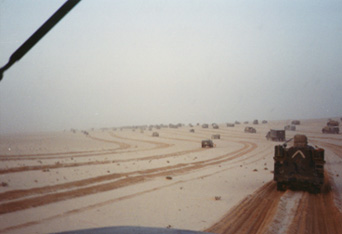
Convoying through Saudi Arabia
Since it was late, I figured I would be in for a well-needed rest in the barracks. With normal work hours ending at 5:30, everyone should be done for the day. Wrong! I got there just in time to head down to the shop with the rest of the guys for 8:00 formation. They were in full swing of packing things up for deployment.
Everyone was very nice in helping me get established at the new unit. We were about to all share in an experience of a lifetime. Everyone knew that there was a possibility of going to war before they joined. In that era, most didn't think it was going to happen during their enlistment; myself included.
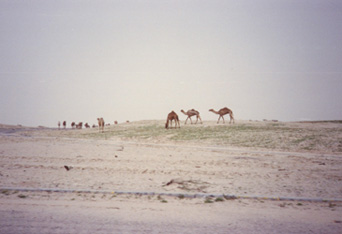
The gratuitous "camels in the desert" picture
We finally got back to the barracks around 10:00. I was beat. I met a few more of the guys before taking a shower and going to bed. I slept like a rock. As the days went by, we continued to get all the equipment ready for deployment. We had additional chemical training since Saddam Hussein was well known for his use of chemical weapons. We spent extra time cleaning and maintaining our M-16s and protective masks.
All of the vehicles that were going with us had to be loaded on trains and taken to the shipyard where they could be put on boats. It would take about three weeks for them to arrive in Saudi Arabia. I spent two days on a detail loading rail cars. We had well over 100 vehicles to be shipped.
Once everything was packed up and ready to go, we played the waiting game for our deployment date. The shop was mostly empty, all of our personal gear was packed up and our personal items in the barracks were limited. Our private property was locked up in storage since we had no idea how long we would be gone. So, now we wait for marching orders.
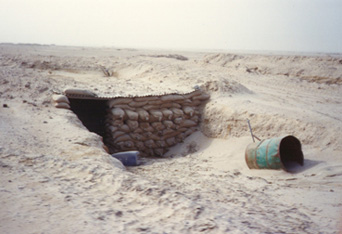
An enemy bunker
Since there wasn't much to do with all of our equipment gone, they frequently let people go home and spend time with their families. The guys in the barracks hung out playing Nintendo, went to the bar at night, or just relaxed. The clubs on post had slot machines and video poker. That was also a popular pastime. Renting videos helped kill the time too.
Four different deployment dates came and went before we finally shipped out. They kept getting delayed and rescheduled. We finally flew out of Germany on Christmas Day, 1990. What a great way to spend the holidays.
We flew to Saudi Arabia and stayed in warehouses at the port in Dhahran. It would take about ten days before the first shipment of our equipment arrived. Once again, we played the waiting game.
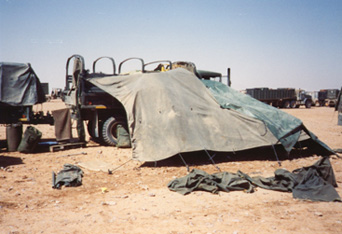
This was our home in Iraq for six days. It slept three.
One day while at the port, I was hanging around outside the warehouse watching troops walk by. I saw a familiar face. It was my best friend! What are the chances? There were about 1200 people in each building and there were eight buildings. Imagine how many people knew others that were there but just never happened to cross paths. Amazing!
We had been friends since the 2nd grade. In high school, we planned to join the Army together in the COHORT program. That's where they guarantee that you go to basic training and your first duty assignment together. Ron was a year behind me in school so I would have to wait a year before we both could join. That's what lead to the demise of our plan.
The unfortunate part of our meeting is why we crossed paths. Ron's brother had been in a car accident and Ron was trying to find a chaplain to get in touch with the Red Cross to make arrangements for him to fly home. We ended up spending a few hours together before he had to meet with the chaplain. With all of the people there, I still can't believe I bumped into him!
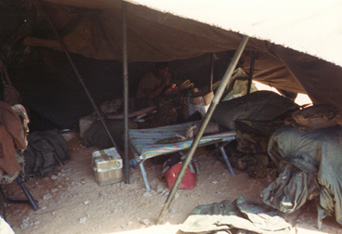
An inside look
When the boat came in, there were a handful of vehicles that didn't make it on that shipment. After waiting a few more days, most of the unit convoyed out into the desert while some stayed back at the port waiting for the remainder of the vehicles to arrive. The next boat came in after a few days and we all met up together in the desert at our designated spot.
There were multiple places where vehicles got stuck. There were giant sand traps. The weight of the vehicles would cause them to sink in the soft sand. The recovery team got a workout that day. They must have pulled out 10 to 15 stuck vehicles.
Once all vehicles and personnel had reached our first camp location, it was time to set up a perimeter. We dug fighting positions in 90 degree heat. We filled over 1000 sandbags for the company bunker. My hands were so sore from tying the strings on the sandbags all day, I could barely curl my fingers to make a fist.
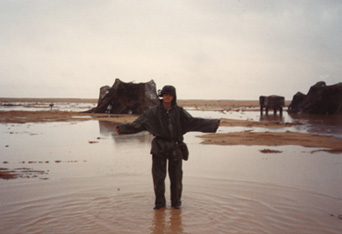
Who says it doesn't rain in the desert?
Wake up was 3:30 am and we worked until 9:00 pm. Those are long days in 90 degree heat. Then, of course, there were always guard duty shifts throughout the night. It was six days before we were able to use our first makeshift shower. After working those kinds of hours in those temperatures, we were pretty ripe. You could hardly stand to smell yourself in your sleeping bag.
The nights got very cold in the desert. The water in our canteen was frozen most mornings. This was in mid to late January. Hot days and cold nights took its toll on you. In late January, it rained for three days straight. It filled the bottoms of our foxholes and flooded our tents. It seemed that the hot sun baked the ground so when it got wet, it couldn't absorb the water. It took over a week for the water to finally soak in or evaporate.
Things got more intense when the air war started. We were about 60 miles inside the Saudi Arabia/Iraq border. There was definitely some concern that once the bombing began, the Iraqi troops would invade Saudi Arabia. We stayed on a heightened level of alert, increasing our guard duty shifts. Everyone was on edge for the next couple of days; more so than usual.
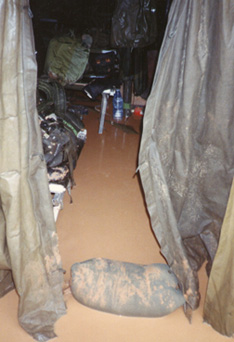
Our tent was flooded
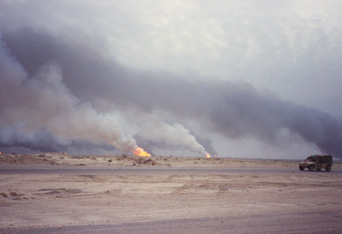
Burning oil wells in Kuwait
On February 28th, the day the ground war started, we moved into Iraq. We were lead by the Cavalry. Once again, we were a bunch of mechanics, welders, and machinists. We were trained to fight, but it's not what we did every day. We were usually well protected wherever we went. Good care has to be taken of the people who are going keep the equipment operational.
We came to a stop in Iraq for about a week. There was no time to set up tents for living quarters so we had to make do with what we had. After sleeping in the cab of the truck the first night, we had to come up with something different. The next day, we untied one side of the truck bed cover and staked it to the ground. This was our overhead shelter. We setup three cots under it. Despite its looks, it was a pretty comfortable living arrangement.
Before we knew it, the ground war was over. Because of its short duration, it was nicknamed "The Hundred Hour War." We continued on into Kuwait where we stayed for 43 days. We stayed at a Kuwaiti military base. Finally, some cement under our feet! Here, we had access to a small PX and they also had a phone center set up so we could call home.
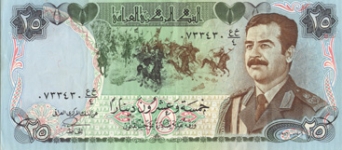
Front of a 25 Dinar bill
On their way out of Kuwait, the Iraqi Army set fire to hundreds of oil wells in Kuwait. The smoke from the burning oil wells cast a gloomy look over the sky. It made it look like there was always a thunderstorm about to happen.
In Kuwait, we made our home in the office buildings of the motor pool. They had no doors and the windows were blown out. The rooms were small; about 20 feet by 20 feet. We were able to sleep five in each room. They were tight quarters, but luxurious compared to our previous living conditions. You can see the rooms in the background of the picture of me holding the Pepsi can on the home page. The three windows that you see are in one room.
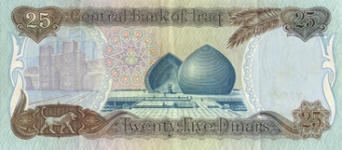
Back of a 25 Dinar bill
We were able to take regular showers at this location. The water was heated by the sun. Sometimes you got a warm shower; sometimes not so warm, but it was still a shower. During one shower, after rinsing the soap off of my face, I opened my eyes to see a four inch long lizard on the shower wall right in front of me. Nice!
It was mid-April and it was pretty hot outside. I don't recall the temperature but it was warm enough that if we weren't working on a mission essential job, we were off duty with strict orders to stay hydrated. Avoiding heat injuries was a top priority.
In the first week of May, we headed back to Saudi Arabia to prepare our equipment for the trip back to Germany. There wasn't a whole lot to do there since we had designated teams of soldiers to do this. We spent some time in the makeshift movie theater and had plenty of time to make phone calls home. We pretty much took it easy for a couple of weeks while we waited to depart. That day finally came on May 23, 1991. What a happy day it was!
